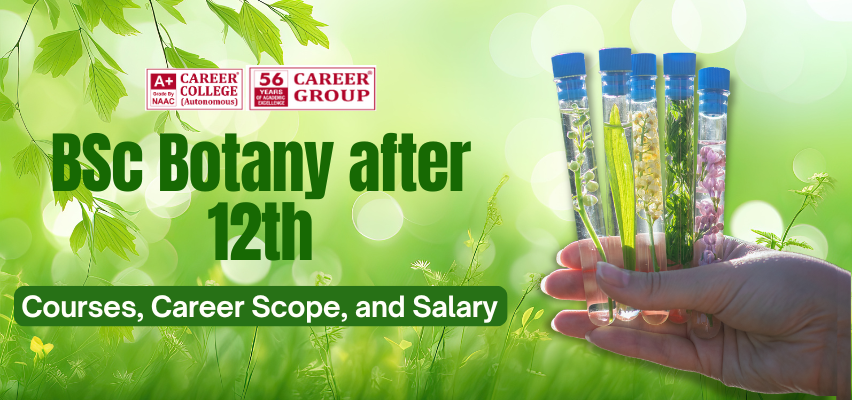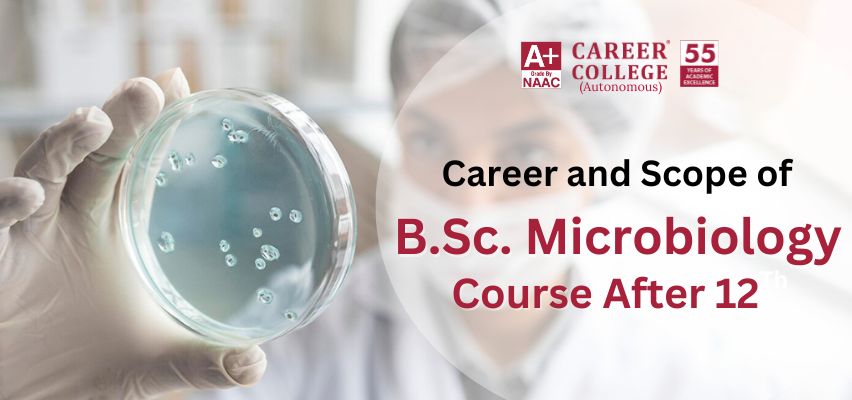Table of Contents
ToggleBSc Botany After 12th: Courses, Career Scope, and Salary
BSc Botany: Bachelor of Science in Botany, is a three-year undergraduate degree course, it focuses on the advanced study of plants and other micro-organisms, like bacteria, fungi, and algae, and how plants play an essential role in the environment. This blog will talk about the career opportunities, scope, salary, and the best college in Bhopal for BSc Botany, such as Career College (Autonomous) Bhopal offering this course.
What is Botany?
Botany is a major subject for the scientific study of plants, to analyze their properties, structure, inheritance, and their biochemical process. It plays an important role in various sectors such as medicine, environment, and agriculture. Understanding plant life is very important for the maintenance of our ecosystem, agriculture, and medical research.
Why is Botany Important?
Environmental Conservation: To maintain a healthy ecosystem, Botanists are essential.
Agricultural Development: A deeper knowledge of plant science improves sustainable agricultural techniques and food security.
Medical Research: Botany is important for developing new medicines since plants are the main source of so many effective medicines. Many medicines are received from plants.
Climate Change Mitigation: By Observing Carbon Dioxide and Producing Oxygen. Plants play an important role in reducing global warming.
Branches of Botany
The following are the primary branches of botany:

Plant Anatomy: The study of plant cells and tissues and the structure of the plants.
Plant Physiology: To understand the functionality of plants, such as the growth of a plant, photosynthesis, and respiration.
Plant Genetics: The study to analyze genetic inheritance, breeding of plants, and modification.
Plant Ecology: Study to analyze how plants interact with their environment and ecosystems.
Plant Taxonomy: The study of the classification and naming of plants, analyzing their evolutionary relationships.
Phytochemistry: Study of the chemical processes within plants, specifically those used in medicines and industry.
Ethnobotany: Explores the relationships between people and plants, including their use in medicine, food, and cultural practices.
Plant Pathology: Study of plant diseases, including their causes and prevention.
Horticulture: Focuses on the cultivation of plants for food, medicine, and ornamental purposes.
Economic Botany: Analyzes the financial value of plants, focusing on their roles in the agriculture sector, pharmaceuticals, and industry.
Why choose a BSc in Botany after the 12th?
The following are some major reasons:
Diverse Career Opportunities: A BSc in Botany can lead to many career opportunities in environmental management, research, agriculture, pharmaceuticals, and many more.
Solid Foundation: to develop the essential abilities, the course offers a strong foundation in biological science together with hands-on experience in lab and fieldwork.
Growing Demand: With the increasing focus on sustainability, The demand for botany graduates is high in the agriculture, pharmaceutical, and industrial sectors.
UG/PG Courses in Botany
Botany offers a range of courses catering to different academic and career interests:
Undergraduate Courses:
- BSc Botany: A three-year degree course covering fundamental topics in plant science.
- BSc Botany Honours (Hons): An honours course focusing on research and specialization.
Postgraduate Courses:
- MSc Botany: A two-year PG course provides advanced studies in plant biology and research methods.
- MPhil and PhD in Botany: Research-focused degrees for those aiming at academic and high-level research careers.
BSc Botany Subjects
During a BSc in Botany, students explore various subjects, including:
- Plant Ecology
- Plant Physiology
- Anatomy
- Plant Embryology
- Plant Evolution
- Advanced Plant Breeding
- Ecology
- Biotechnology
- Seed Biology
- Algae and Microbiology
- Molecular Biology
- Economic Botany
- Chemistry
- Environmental Science
- Gymnosperms
BSc Botany Scope
The scope of a BSc in Botany offers a wide range of career opportunities in multiple fields. Such as research, environmental management, pharmaceuticals, agriculture, and many more. Botanists play an important role in preserving the environment and developing sustainable agriculture practices, and plant-based medicines. Also, graduates can select careers in education, biotechnology, and horticulture.
Jobs after BSc Botany
A BSc in Botany opens doors to numerous career paths:
Career Role | Description |
|---|---|
Research Scientists | Research work in areas like genetics, plant biology, or ecology. |
Environmental Consultant | Advice on environmental conservation and environmental protection projects. |
Agricultural Scientist | Improves agriculture technique and crop variety. |
Phytochemist | Analyze medicinal plants for use in pharmaceuticals and other industries. |
Plant Pathologist | Identify and treat diseases that are affecting the plant. |
Conservationist | Work with organizations to protect the biodiversity plant. |
Horticulturist | Focus on improving plant growth and development via garden and landscape management. |
Ethnobotanist | Learn about the role of plants in culture, including their nutritional and medicinal properties. |
BSc Botany Salary per month
The starting salary of a botanist in India depends on their experience, location, and the company the starting package of INR 4 LPA, and the highest package begins with INR 10 LPA, so the approximate salary should be around INR 35,000 to INR 60,000 per month.
Job Profile | Package |
|---|---|
Botanist | ₹4LPA – ₹6LPA. |
Research Scientist | ₹5LPA – ₹8LPA. |
Environmental Consultant | ₹4LPA – ₹8LPA. |
Agricultural Scientist | ₹4.5LPA.-₹9LPA. |
Conservationist | ₹4LPA – ₹6.5LPA. |
Best College in Bhopal for BSc Botany
The Career College in Bhopal is one of the best colleges in Bhopal, Career College is one of the top 5 best colleges in Bhopal Madhya Pradesh, with more than 55 years of academic experience, and offers the best education and placement opportunities. With its Autonomous status, students can be directly admitted to college. The college is affiliated with one of the best government universities Barkatullah Vishwavidyalaya, Bhopal, And the college is accredited by NAAC as an A+ (3.28 CGPA). Career College was awarded by India Today magazine in 2024 as 1st best college in Madhya Pradesh for its BSc. program. The college provides Undergraduate and Postgraduate courses in Botany. They are Focussing on academic understanding and practical application. And special focus on research and development. Prepare students for a wide range of employment in botany-related fields.
Dear students and their guardians are most welcome to visit the Career College (Autonomous) Bhopal, campus and our official website, https://careercollegeindia.com/index.php to learn more about BSc Botany and the admission process.
Conclusion
A BSc in Botany is a great choice for students who are interested in environmental science and plants. There are many interesting and rewarding job opportunities. A degree in Botany provides a solid foundation and opens many career opportunities, regardless of your interest in research, environment, agriculture, and conservation.
Frequently Asked Questions [FAQ’s]
Q1: After BSc Botany which course is best?
Answer: Top 5 courses after BSc Botany.
- M.Sc. Botany.
- B.Ed. after BSc Botany.
- M.Sc. in Horticulture.
- Diploma in applied Botany.
- PG Diploma in Clinical Research.
Q2: What to do after BSc Botany?
Answer: After BSc Botany.
- Researcher
- Botanist
- Ecologist
- Environmental Consultant
- Biotechnology
- MSc Horticulture
- Geneticist
- Master of Business Administration
- MSc Botany
Q3: Government jobs after BSc in Botany?
Answer: Government Jobs after BSc Botany.
- Forest officer
- Lab Assistant
- Ecologist
- Genetics
- Biochemist
Q4: Can I join ISRO after BSc Botany?
Answer; Yes, you can join the Indian Space Research Organization (ISRO) after your BSc in Botany, not as a scientist, but as a technician, assistant engineer, and scientific engineer.



